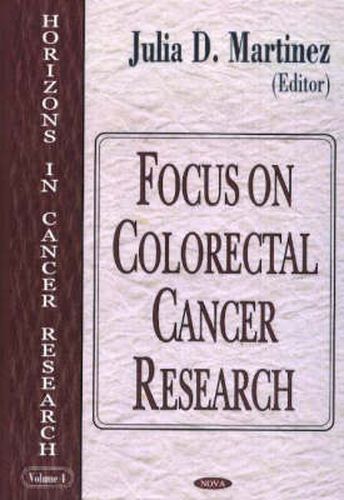Readings Newsletter
Become a Readings Member to make your shopping experience even easier.
Sign in or sign up for free!
You’re not far away from qualifying for FREE standard shipping within Australia
You’ve qualified for FREE standard shipping within Australia
The cart is loading…






In Western countries, cancer of the large intestine and rectum (colorectal cancer) is the second most common type of cancer and the second leading cause of cancer death (after lung cancer). The incidence of colorectal cancer begins to rise at age 40 and peaks between ages 60 and 75. Cancer of the large intestine (colon cancer) is more common in women; rectal cancer is more common in men. About 5 percent of the people with colon or rectal cancer have more than one cancer of the colorectum at the same time. People with a family history of colon cancer have a higher risk of developing the cancer themselves. A family history of familial polyposis or a similar disease also increases the risk of colon cancer. People with ulcerative colitis or Crohn’s disease have a higher risk of developing cancer. The risk is related to the person’s age when the condition developed and the length of time the person has had the condition. Diet plays some role in the risk of colon cancer, but exactly how it affects risk is unknown. Throughout the world, people at highest risk tend to live in cities and eat a diet typical of affluent Westerners. Such a diet is low in fibre and high in animal protein, fats, and refined carbohydrates such as sugar. Risk seems to be reduced by a diet high in calcium, vitamin D, and vegetables such as brussel sprouts, cabbage, and broccoli.
$9.00 standard shipping within Australia
FREE standard shipping within Australia for orders over $100.00
Express & International shipping calculated at checkout
In Western countries, cancer of the large intestine and rectum (colorectal cancer) is the second most common type of cancer and the second leading cause of cancer death (after lung cancer). The incidence of colorectal cancer begins to rise at age 40 and peaks between ages 60 and 75. Cancer of the large intestine (colon cancer) is more common in women; rectal cancer is more common in men. About 5 percent of the people with colon or rectal cancer have more than one cancer of the colorectum at the same time. People with a family history of colon cancer have a higher risk of developing the cancer themselves. A family history of familial polyposis or a similar disease also increases the risk of colon cancer. People with ulcerative colitis or Crohn’s disease have a higher risk of developing cancer. The risk is related to the person’s age when the condition developed and the length of time the person has had the condition. Diet plays some role in the risk of colon cancer, but exactly how it affects risk is unknown. Throughout the world, people at highest risk tend to live in cities and eat a diet typical of affluent Westerners. Such a diet is low in fibre and high in animal protein, fats, and refined carbohydrates such as sugar. Risk seems to be reduced by a diet high in calcium, vitamin D, and vegetables such as brussel sprouts, cabbage, and broccoli.